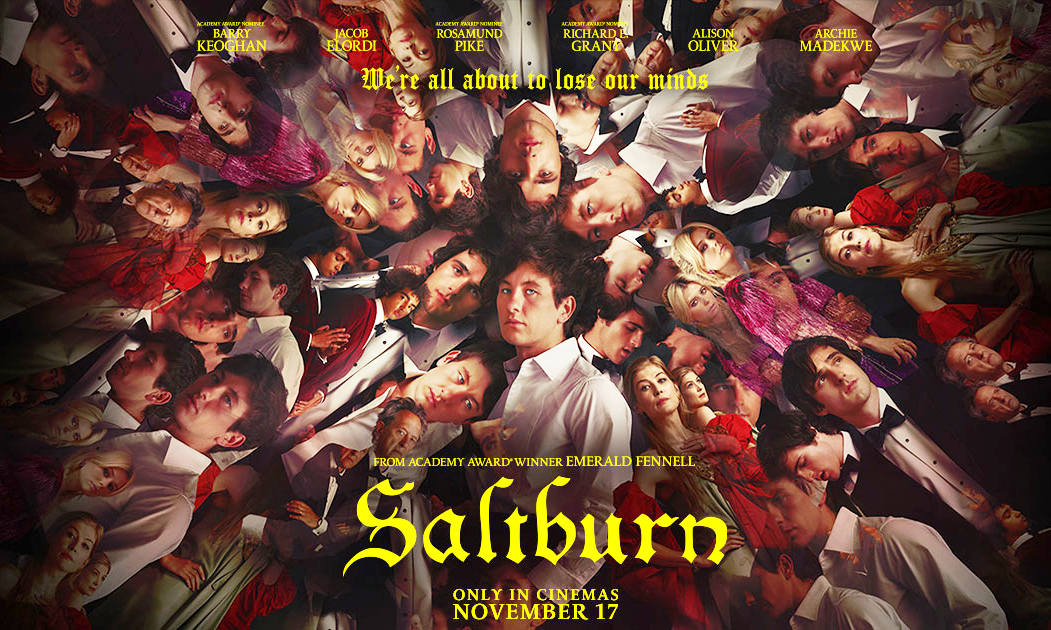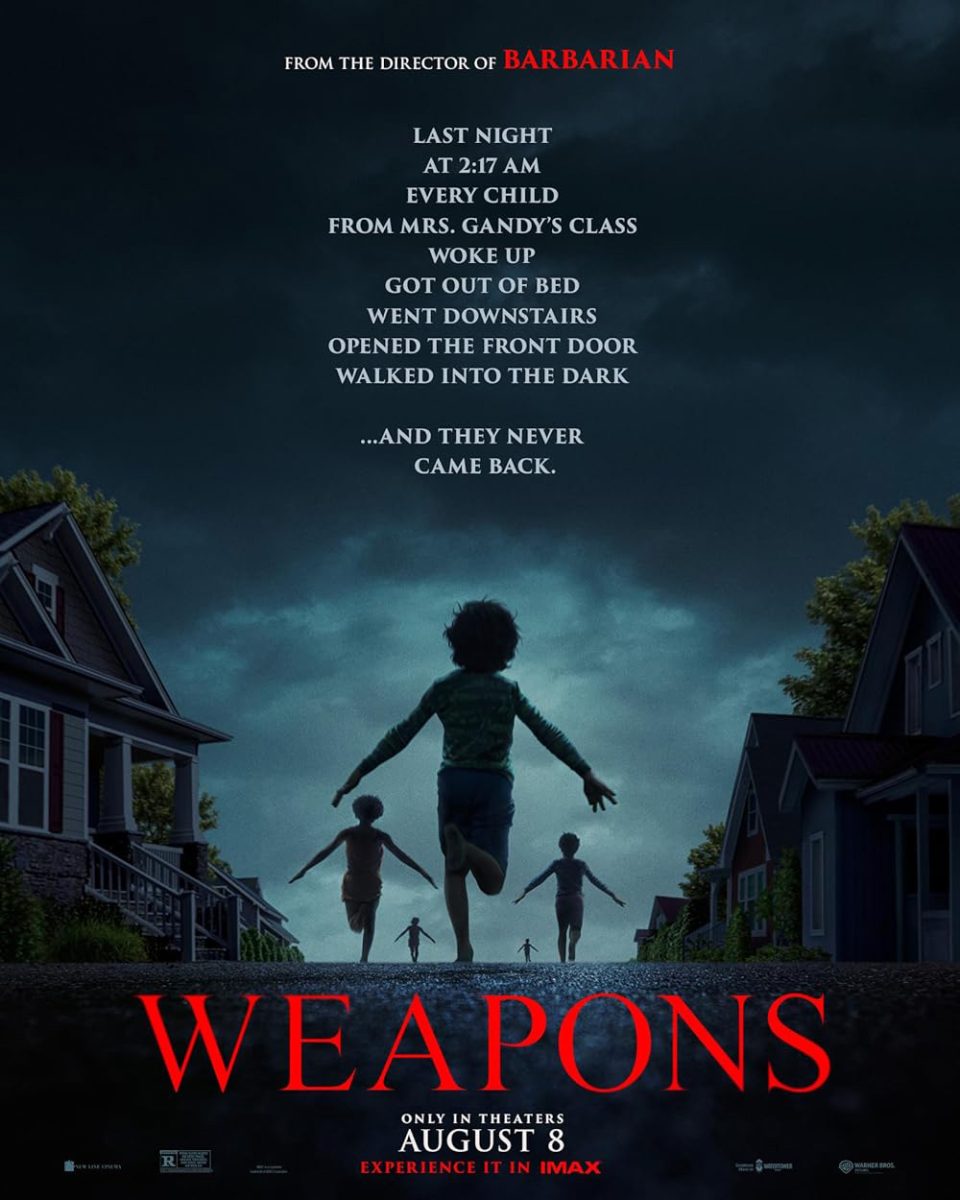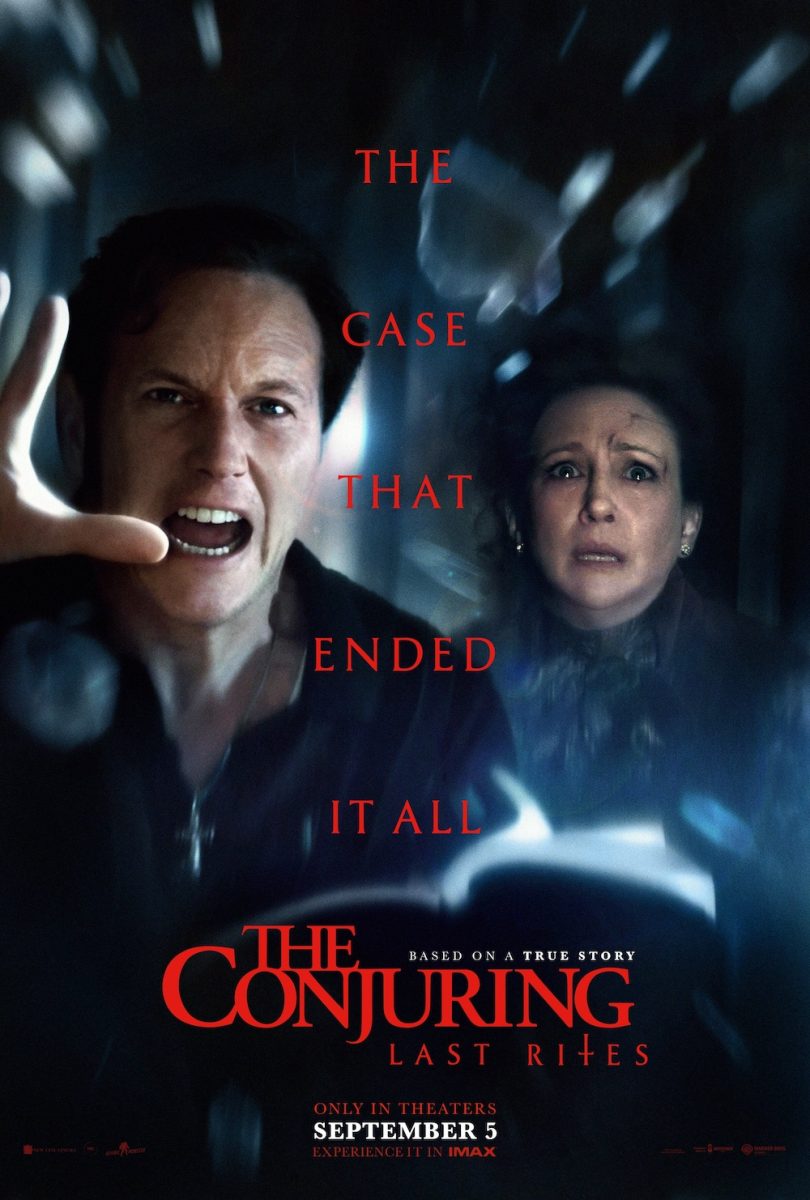Content Warning & Spoiler Warning: This story contains discussion of abuse, substance use, suicide, disordered eating and spoilers.
What’s an R-rated movie you can think of that is so morally bad, but the cinematics, music and plot drags you in like a hypnotic snake? I could name a couple: American Psycho, Eyes Wide Shut, Blue Velvet, but one that recently came out, and matters most, is Saltburn.
This movie has you thinking it’s just another classic coming-of-age movie where college students occasionally party, start to explore their identities, and understand what it is to be an adult in your twenties. What is it actually though? A psychological thriller filled with hidden agendas and a groovy soundtrack.
We start off in one of the first scenes at Oxford University in 2006. Barry Keoghan plays Oliver Quick, a student we quickly come to understand is a nerd and outsider. Early on, he is hinted as being queer or questioning, with an unstated but apparent crush on the rich aristocratic guy, Felix Catton, played by Jacob Elordi. This is hinted at with cutaway shots with Oliver watching Felix while verbally and visually displaying jealousy.
One example is where they flash forward to a scene where Oliver is in a suit talking to someone, and then he describes his feelings towards Felix in a voiceover. This is an example of the Analeepis and Prolepis technique, where they cut back and forth between time periods, and I loved how they did it.
My first thought during this scene is that he is talking to a therapist or a reporter, who is interviewing him. I could imagine his dialogue was in response to someone asking him, “How did you survive?” or “Did you love Felix?” They really painted him as a victim from the get-go, which was a good choice because it doesn’t spoil the entire movie. I felt bad for him in the beginning.
At first this movie has you thinking, “Oh, this guy doesn’t have any friends, he’s the classic nerd, and here comes the popular rich kid he’s in love with.” It’s that classic trope, but it changes into a murderous summer to remember. I think the hinting sets up the storyline well, without giving away the end. That’s how a movie should be. It makes it less predictable. Importantly, the entirety of Saltburn made me feel claustrophobic with little things over a gradual period of time.
A scene early in the film that is called back to at the end is when Oliver tells Felix that he comes from a bad background of abusive parents with drug and alcohol problems, so Felix takes him under his wing. Felix brings him to the river near Oxford and explains he has a family tradition where every time someone dies they write their name on a rock and throw it into the river. He gives Oliver a rock with the word “Dad” on it, and Oliver throws it. The rock lands on the side of the river where there is no water. Oliver says, “That can’t be good.” This scene was one of my bigger hints that there’s more than meets the eye when it comes to Oliver’s traits.
Oliver then heads to Saltburn, Felix’s family home for the summer, a giant mansion estate with butlers and maids to serve your every need. When Oliver is given a tour of the house, we see its impressive collections of historic art, beautiful furniture from previous rulers of Britain and random artifacts the Cattons have grabbed and bought over the generations. Oliver is amazed by all the graceful and distinctive collections throughout the property.
At Saltburn, Oliver meets Farleigh again, Felix’s cousin from America, played by Archie Madekwe. We learn that Farleigh is a troublemaker and a bit of a spoiled brat, but I feel his and Felix’s sister Venetia’s value as characters were under-appreciated. It is very clear they are both suffering mentally and abusing drugs, due to earlier scenes and how other characters are describing them, but I think they are written that way on purpose to evoke empathy in the viewer.
Venetia, played by Alison Oliver, is described by her mother as a masochist with an eating disorder. Felix’s mother and father, Elspeth and Sir James, are played by Rosamund Pike and Richard E. Grant, respectively. Both actors are very good at playing clueless rich parents. Grant has played this similar role before in Penelope, while Pike hasn’t, but took extra care into preparing for this role. According to the Hollywood Reporter, she and one of the writers even asked during her prep time “How can I drape myself all over the furniture?” In an acting perspective, I really respect her and admire her for her dedication to her roles.
At breakfast the first morning, Venetia tells a story about a housekeeper of the poet Percy Shelley. The housekeeper had claimed to see Shelley’s doppelganger walking past the window after his death. This scene had insane foreshadowing, as you can see Felix’s doppelganger walk past the breakfast room window while the story is told. These little details really made me lose my mind while watching this extraordinary movie, especially with the understanding that the story about Shelley was discredited by the characters because it came from a housekeeper. During this scene I had butterflies in my stomach; one of the reasons being that Oliver looked so physically sick during this scene, and another reason being my reaction to Felix’s doppelganger walking past the window.
One of the best scenes in this movie is when Venetia confronts Oliver—she’s sitting in the bathtub and tells Oliver her father described him as Spider-Man spinning his thread and trapping everyone in his “Oliver-ry” webs. Intoxicated at the time, Venetia makes Oliver stay with her and says, “I don’t think you’re a spider, I think you’re a moth.” As she says the metaphor, her words are broken up and she is seen as always on the verge of tears. Alison Oliver, the actress who plays her, does a really good job of establishing her character as on the ledge emotionally.
As she compares Oliver to a moth, she says, “Quiet, harmless, drawn to shiny things, patting up against the window, just desperate to get in.” This scene is insanely tense and psychologically draining. I had my hand over my mouth the whole time. The next morning, Venetia was dead in the bathtub and the loudest score of music played in my ears.
Speaking of music, when you think of a thriller or horror movie you think of the cliche score of string instruments when a victim is running from a killer, you think of darkwave synths that have darker nodes. What you don’t think of is a guy dancing naked to “Murder on the Dancefloor” by Sophie Ellis-Bextor after killing a high aristocratic family.
The musical decisions that went into this movie were perfect to match its mothy–referencing when she calls him a moth– intentions, another song being “Destroy Everything You Touch” by Ladytron, which plays during a bar scene in which Felix pays for a round of shots thinking Ollie couldn’t afford it.
However the actual score of the movie, composed by Anthony Willis, is one of the best music scorers to me. The music matches that claustrophobic impression that the movie oozes: that feeling like you want to leave the room while watching it, but you’re trapped with the movie. I personally felt like it leeched on me, sucked out my energy, and then left me with music that made me ache with twisted joy. It makes sense why Saltburn also has such a good score given Willis has previously scored both horror and drama movies. He has also scored How to Train Your Dragon: Homecoming (2019), Promising Young Women (2020) and M3GAN (2022). I think that’s one of the reasons it makes Willis perfect for it, along with the fact that he is more fresh when it comes to composers.
Another song in the Saltburn soundtrack is from earlier in the movie when Oliver is touring the Cattons’ Mansion: “Felix’s Tour.” A very calming piece of music, the type I’d even go to say to use as white noise. The ability it has to calm you really proves that Willis’ range of emotion during this movie matches the space you end up in. You feel calm, you groove to some 2000’s bops, you feel disgusted and concerned, you laugh nervously.
All this and more are the reasons you should watch Saltburn, listen to Saltburn, but also to just feel what Saltburn has to offer as a psychological thriller.









